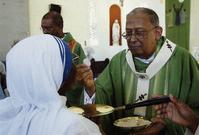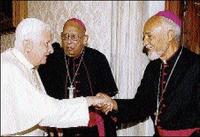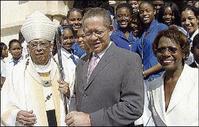Mark Dawes, Staff Reporter
The Most Rev Lawrence Burke, then archbishop of Kingston, speaks to Prime Minister Bruce Golding and his wife, Lorna, while leaving the Holy Trinity Cathedral in Kingston after the Liturgy of the Eucharist in honour of the sesquicentennial anniversary of the Immaculate Conception High and Preparatory School on Sunday, January 13. - Rudolph Brown/Chief Photographer
On Sunday, May 2, 2004, the Most Rev Lawrence Burke was officially installed as archbishop of the Metropolitan See of Kingston. This jurisdiction includes Belize the Cayman Islands, Kingston, Montego Bay and Mandeville. For the dioceses of Montego Bay and Mandeville, however, the archbishop has ceremonial and not executive powers. This is so because those two dioceses have their own bishops.
Almost four years to the day he was made the highest-ranking Jamaican Roman Catholic clergyman, Archbishop Burke has gone into retirement.
Archbishop Burke was born into a Roman Catholic family on October 27, 1932. He grew up in Vineyard Town, Kingston, and from early he came under the influence of Jesuits. He was impressed by them and even more so when he attended St George's College on North Street, Kingston. After graduation, he joined the teaching staff in January 1951 and by August that year, he went to Boston College to study for the priesthood. He returned to Jamaica in 1958 and as a scholastic, he taught chemistry for three years at St George's. He holds a one-of-a-kind relationship with St George's. He is the only person to have taught there as a member of the laity, then as a priest, then hold the office as chairman of the board and acting principal.
Appointment

Pope Benedict XVI greets the Most Rev Donald J. Reece (right), then coadjutor archbishop of Kingston. At centre is the Most Rev Lawrence Burke, then archbishop of Kingston. The occasion was the visit of the bishops of the Antilles Episcopal Conference with the Holy Father in Rome. - Contributed
During his long association with St George's, he was appointed superior to the Jesuit community there, and then regional superior which meant he was the liaison between the archbishop of Kingston and the bishop of Montego Bay (the church had two dioceses then. It has three at present). As superior, he found himself in the charge of not just St George's, but Campion College as well. He was also involved in: publishing the Catholic Opinion, fostering the growth of the credit union movement and providing training to persons working in sugar workers' co-operatives. His last post at St George's was that of acting principal. He was in that job for 18 months when Pope John Paul II summoned him to become the bishop of Nassau. He served in that post for 23 years until he was again summoned by the Holy Father to leave The Bahamas and come back to his homeland in 2004.
His return to Jamaica was occasioned by the mandatory retirement of Archbishop Edgerton Clarke, who on February 14 2004, celebrated his 75th birthday. In keeping with canon law, bishops as a rule must submit their resignation to the Vatican at 75. The Pope may or may not accept that resignation. The only exception to this rule is the holder of the office of bishop of Rome.
Did you enjoy your time as archbishop of Kingston?
I enjoyed it tremendously and I wish it were much longer. There are so many challenges that Jamaica poses, and so many possibilities that I regret that I did not have more time in my native country in a leadership role. When I came to Jamaica four years ago, I found that a lot of good things were happening. We had a tremendous and talented group of lay people and also a good group of priests - local and missionary priests who were working with us. But I also found that there was a lack of organisation, and a lack of process about how to go forward. So one of the challenges I had was to bring a little bit more organisation to the Archdiocese of Kingston.
Do you believe you have left the archdiocese better than you found it?

The Most Rev Lawrence Burke, then archbishop of Kingston, gives communion to a religious sister during Mass at the Holy Trinity Cathedral in Kingston last September.
- Ricardo Makyn/Staff Photographer
Certainly, in some areas it is better. For example, my big priority was to strengthen our Catholic schools and to bring back more of a Catholic ethos and presence in the schools. I believe that education is not a quick fix but a long-term solution to many of the problems we face in Jamaica - especially the problems of the values and the attitudes - what we bring to our communities and the whole area of criminal activities and corruption and violence. I think education is a key. I regret that since our Independence in 1962, we have not been able to bring quality education to our people. Because a lack of education keeps people dependent upon those in power. And good education frees people up and gives them choices to make in life. I just think it is regrettable the quality of education we have passed on to our people since 1962. I find that in the present system, we are preparing children to pass exams but I don't think we are really educating them. We need to educate them and to motivate them. Not only teach them the fundamentals that we need to make a living. But we also need value education to live together in understanding and mutual harmony.
For you, an educated person has values?
Absolutely. It is not just information, but formation. I believe that these institutions that we call our schools are tremendous assets to us, that is why we are trying to reclaim them. One of the things I have done is to re-establish an education secretariat for the church, which is the liaison for the church and the different boards that run our schools. It is a way that they can be accountable to us and we can also be supportive of them. When we have a meeting of our Archdiocesan Education Board - which sets policies for our schools - at the end of that meeting if you don't have a secretariat, someone who can carry out the policies, then the meeting was in vain.
We have set up a strong scholarship programme to get more of our Catholics into teaching; also to get Catholic teachers, who would have a greater sense of ownership of our Catholic institutions like our schools, to get them prepared to exercise leadership in our schools. We have to get them qualified at the University of the West Indies or other places where they can take up leadership. I believe the quality of our schools depends upon the personnel, the teachers, the faculty and the leadership of the principals and vice-principals.
If you were to offer some advice to your successor, the Most Rev Don Reece, what would that advice be?
I think my successor is on the same wave length as far as education is concerned. I think we need to address more than I did in my time - the whole area of family life. During my time, we actually employed someone full time in the area of family life ministry. Again, that is someone who can carry out the decisions and policies that the Family Life Commission of the arch-diocese have agreed to. One of the problems has always been that we have not publicised some of our programmes sufficiently. This results in our counsellors not being used as efficiently and as often as they should be in programmes that are prepared to help out.
What kind of man is your successor, Archbishop Don Reece?
He is a Jamaican. He spent 26 years as a bishop in Antigua. The people loved him there and they were very unhappy to see him leave. He is very personable. I think he will also follow up on the whole area of education.
He has already begun to meet with the small groups of our priests who are very important collaborators with the bishop in setting the tone for the archdiocese. He has been in meetings with them in small groups, assuring them and also trying to listen to their concerns and thoughts to develop the diocese.
I think he has hit the road running. All indications are that he is going to be a very fine archbishop. One regret - he is an older man. I hope he will have enough years to make a difference in the church in Jamaica. He also comes with tremendous experience in ecumenical affairs. He has been a member for years of the working group in the World Council of Churches. He has been and still is one of the presidents of the Caribbean Conference of Churches. He has been a member for years of the Roman Catholic Council on Ecumenical Affairs in the Vatican.
I am sure he will bring a lot to the table of the Jamaica Council of Churches and working with evangelicals and other Christian groups. He will also be very open to working with others in inter-religious dialogue.
(See Monday's Gleaner for part two)
Send feedback to mark.dawes@gleanerjm.com.
Editor's note: See also a 2004 Gleaner interview with Archbishop Lawrence Burke @ jamaica-gleaner.com/gleaner/ 20040515/lead/lead4.html.

